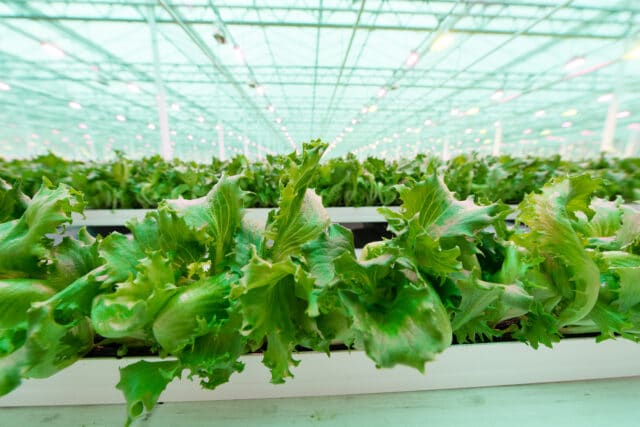Paul Sellew
CEO of Little Leaf Farms
Age: 61
Industry experience: Life-long
As a longtime operator of agribusinesses, Paul Sellew recognized a need for better quality lettuce in New England. He founded Little Leaf Farms in 2015 to grow leafy green lettuce using hydroponics, a method of growing plants indoors, without soil. Shipping to supermarket chains throughout New England, the company each month produces more than 1 million boxes of leafy greens grown sustainably in a greenhouse with no pesticides, herbicides or fungicides.
When Sellew, who grew up working on his family’s farm, decided to seek financing to expand the business, he considered several banks and decided to work with Bank of America. The lender provided more than $18 million in financing to build a new greenhouse in Devens, doubling the operation there from 5 to 10 acres. An additional $20 million in financing will follow, allowing Little Leaf Farms to expand operations into New York, New Jersey, Pennsylvania and North Carolina.
Before starting Little Leaf Farms, Sellew founded Harvest Power, a Waltham-based organics recycler that converts food and yard waste into fuel and other products. He also co-founded and operated Backyard Farms in Maine, a 42–acre greenhouse that grows tomatoes year-round.
Q: What makes your product unique?
A: The idea behind it was to grow and sell a better–quality leafy green that makes a better salad than what was available in the market. It’s all about freshness. We cut and deliver it within 24 hours, compared to the stuff that’s coming from California, which dominates the market. We’re over 3,000 miles away, so they can’t match our quality and freshness.
Q: What financing did you use when you first started out in 2015?
A: Basically, a combination of equity and also financing from MassDevelopment, which is a quasi-public agency that helps new businesses form and finances businesses throughout the commonwealth.
Q: Why did you decide to seek additional financing?
A: Growing the business. We grow the best lettuce here in New England, and people love the product. We want to grow more of it and service the market that really wants our product.

Planning a big expansion of their Devens hydroponic greenhouses, Little Leaf Farms turned to Bank of America for a large loan for what, by New England standards, is a fairly unconventional operation.
Photo courtesy of Robin Terhune Photography
Q: What was the process like for you to secure this financing from Bank of America?
A: We’re profitable. They’re a senior lender, and they believe in our business. They believe in our vision. They love what we’re doing.
They have a strong ESG component to their lending practices. But obviously, they’re a senior lender, so the underlying business fundamentals have to be there to support senior debt, and based on that, they’ve been great to work with. Our loan officer is a guy by the name of Randy Mitchell who works out of their Boston-area middle market office. It’s been a great relationship with Randy.
Q: What were some of the challenges with getting such a large amount of financing?
A: The bank needs to know – like any bank would – that the underlying asset value is there and that the business has the ability to generate the free cash flow. They have to trust that management will be able to fulfill their promises and commitments to the bank.
Q: What will some of your responsibilities be now that you have this financing?A: Put the money to good use. Construct the new assets. Bring the assets into production. Run the operation. Sell the product and generate the returns that we represented it would. We’re looking to grow the business and sell our customers in those new markets and open up new customers.
Q: What have you learned about financing for agribusinesses?
A: Banks lend money to companies that they feel are creditworthy. They go through their process, so that’s up to the banks on who they lend to. Agribusinesses need to live up to their representations and generate the returns to justify a bank wanting to finance them.
Sellew’s Five Favorite Books
- “The Wizard and the Prophet” by Charles Mann
- “Boys in the Boat” by Daniel James Brown
- “The Omnivore’s Dilemma” by Michael Pollan
- “Bad Blood” by John Carreyrou
- “Einstein: His Life and Universe” by Walter Isaacson




 |
| 

